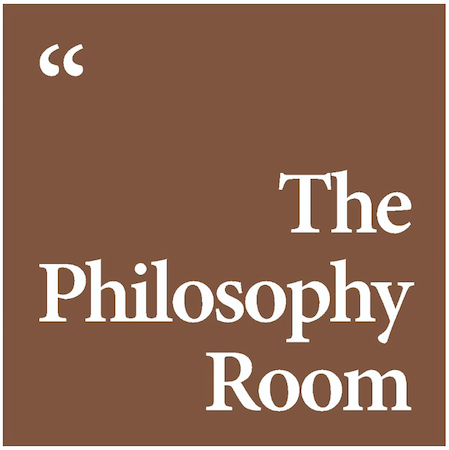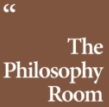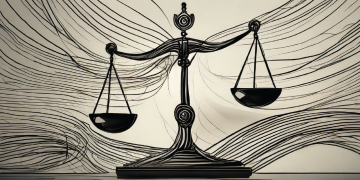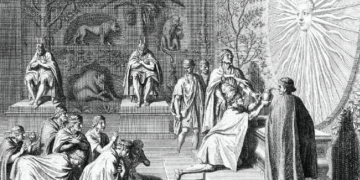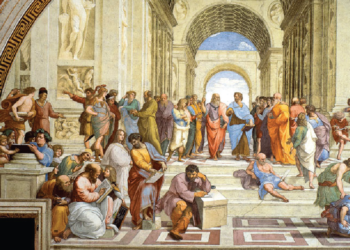Authority
1) Authority and Legitimacy:
Authority and legitimacy are two concepts that are often used interchangeably but have distinct meanings in political science. Authority refers to the power that individuals or institutions have to make decisions and enforce them, while legitimacy refers to the acceptance of that authority by those who are subject to it.
Authority is the power or right to make decisions and enforce them. This power can be held by individuals, groups, or institutions, such as governments or courts. Authority can be exercised through coercion, such as the use of force or threats of punishment, or through persuasion, such as appeals to tradition or the use of language and rhetoric. In political systems, authority is often centralized in institutions of the state, such as the executive, legislative, and judicial branches.
Legitimacy, on the other hand, refers to the acceptance of authority by those who are subject to it. Legitimacy is not necessarily tied to the source of authority or the methods used to enforce it but rather to the perception of that authority as just and valid. Legitimacy can be based on a variety of factors, including tradition, law, democratic procedures, or the perceived effectiveness of the authority in achieving its goals.
The relationship between authority and legitimacy is complex. Authority can exist without legitimacy, as in the case of a dictatorship or a tyrant who holds power through force or coercion but is not accepted by the people. However, such systems are often unstable and can lead to rebellion or revolution if the people do not accept the authority as legitimate.
Legitimacy can also exist without authority, as in the case of social norms or informal systems of governance. These systems may not have a formal source of authority, such as a government, but are accepted by the people as legitimate because they are seen as just and effective.
In political systems, the legitimacy of authority is crucial for maintaining stability and avoiding conflict. When people accept the authority as legitimate, they are more likely to comply with its decisions and rules, even if they do not agree with them. This makes it easier for governments to enforce laws and policies and to maintain social order. On the other hand, when authority is not perceived as legitimate, people are more likely to resist or challenge it, which can lead to social unrest, violence, or even revolution.
The concept of legitimacy is particularly important in democratic systems of governance. In a democracy, authority is derived from the people, who elect representatives to make decisions on their behalf. The legitimacy of these representatives depends on the perception of the people thattheir decisions are just and fair. If the people do not accept the authority of their elected representatives, they may choose to vote them out of office or engage in protest or civil disobedience.
2) Authority and Ethics:
Authority and ethics are two concepts that are deeply intertwined, as the ethical considerations involved in the exercise of authority have far-reaching implications for individuals and society as a whole.
Firstly, we must define what is meant by the term authority. Authority refers to the power or right to give orders, make decisions, and enforce obedience. It is a concept that is pervasive in modern society, with authority figures ranging from government officials and law enforcement officers to parents and teachers.
However, the exercise of authority raises ethical questions, particularly when it comes to issues of power and control. The normative question of authority asks whether those who hold positions of authority have a moral obligation to use their power in a responsible and ethical manner.
One of the primary ethical considerations involved in the exercise of authority is the question of legitimacy. Legitimate authority is the idea that individuals in positions of power have a moral right to make decisions and give orders, based on their role within a social or political system.
For example, a police officer has legitimate authority to enforce laws and maintain public safety, while a teacher has legitimate authority to instruct and guide students in their learning.
However, the question of legitimacy also raises issues of accountability and transparency. Those who hold positions of authority must be accountable for their actions and decisions, and must be transparent in their decision-making processes. This ensures that those in positions of authority are acting in the best interests of those under their authority, rather than serving their own interests or agendas.
Another ethical consideration involved in the exercise of authority is the question of fairness and justice. Those in positions of authority must make decisions that are fair and just, taking into account the needs and interests of all individuals affected by their decisions.
For example, a judge must make decisions that are fair and just, based on the evidence presented in a case, rather than being swayed by personal biases or external pressures.
The question of authority also raises issues of power and control. Those in positions of authority often have the power to make decisions that affect the lives of others, and this power can be easily abused. It is therefore essential that those in positions of authority use their power in a responsible and ethical manner, ensuring that they do not abuse their power or engage in behaviors that are harmful to those under their authority.
3) Authority and Psychology:
Authority is a concept that has been explored and analyzed by various disciplines, including psychology. From a psychological perspective, authority refers to the power or control that an individual or group possesses over others. This authority can be based on various factors, such as social status, expertise, or position of leadership. One of the most influential figures in the field of psychology who explored the concept of authority is Sigmund Freud.
Freud was interested in understanding the psychological underpinnings of authority and its impact on individuals and society. In his work, he suggested that authority is rooted in childhood experiences and the internalization of parental figures. According to Freud, children develop a sense of authority based on their experiences with their parents or caregivers. These experiences shape their understanding of what constitutes appropriate behavior and the consequences of disobedience.
Freud believed that the internalization of authority figures played a significant role in shaping an individual’s personality and behavior. He suggested that individuals who internalized authority figures in childhood were more likely to comply with authority figures in adulthood, even if they were not legitimate or deserving of that power. This compliance could be seen in various settings, such as the workplace, government, or religious institutions.
One of the key concepts that Freud developed to understand authority was the idea of the “superego.” The superego is a component of the psyche that represents the internalized parental authority. It is responsible for regulating an individual’s behavior and enforcing moral standards.
According to Freud, the superego is a powerful force that can be difficult to resist. Individuals who have a well-developed superego are more likely to comply with authority figures and adhere to social norms.
Freud also explored the concept of the “authoritarian personality.” This personality type is characterized by a rigid adherence to authority, a strong desire for order and control, and a tendency towards aggression towards those who challenge or threaten that authority. According to Freud, the authoritarian personality is a result of childhood experiences with strict and punishing parents who emphasized obedience and conformity.
The concept of the authoritarian personality has been criticized for its potential to pathologize individuals who exhibit certain personality traits. However, it remains a useful tool for understanding the psychological underpinnings of authority and its impact on individuals and society.
Another influential psychologist who explored the concept of authority is Stanley Milgram. Milgram is best known for his experiments on obedience to authority, which tested the limits of individuals’ willingness to comply with authority figures, even when their actions went against their moral values.
Milgram’s experiments involved participants who were asked to administer electric shocks to a “learner” (who was actually a confederate) every time they answered a question incorrectly. The shocks increased in intensity with each wrong answer, and the learner eventually began to scream in pain and beg for the experiment to stop.
Despite these pleas, most participants continued to administer shocks until the end of the experiment, under the instruction of the authority figure conducting the experiment.
Milgram’s experiments showed the powerful impact of authority on individuals’ behavior, even in situations where their actions went against their moral values. They also demonstrated the potential for individuals to relinquish their personal responsibility and agency in the presence of authority figures.
4) Authority and Sociology:
Authority is a crucial concept in sociology, as it refers to the power that individuals or institutions hold over others. In a sociological perspective, authority is not simply a matter of physical force or coercion, but rather a complex social process that involves legitimacy, tradition, and cultural norms.
Max Weber, a German sociologist, is one of the most influential thinkers on the topic of authority. He defined authority as the ability to get people to do things that they would not otherwise do, through the use of coercion or legitimacy. Weber identified three types of legitimate authority: traditional, charismatic, and rational-legal.
Traditional authority is based on custom, tradition, and history. It is typically associated with pre-modern societies, where power is often held by kings, chiefs, or other traditional leaders who are believed to have a divine or ancestral right to rule. In traditional societies, authority is often based on familial or tribal ties, and is transmitted through a system of inheritance or appointment.
Charismatic authority, on the other hand, is based on the personal qualities and abilities of an individual leader. Charismatic leaders are often seen as having a special ability to inspire and motivate others, and their authority is based on their ability to communicate a vision or ideology that resonates with their followers. Examples of charismatic leaders include religious prophets, political revolutionaries, and inspirational speakers.
Rational-legal authority is based on rules, regulations, and laws. It is typically associated with modern societies, where power is held by institutions such as governments, bureaucracies, and legal systems. In rational-legal societies, authority is based on the belief that power should be exercised according to established rules and procedures, rather than through personal or arbitrary means.
Weber’s typology of authority highlights the different ways in which power can be legitimized in different societies. Traditional authority is often associated with societies that are based on kinship and family ties, while charismatic authority is more likely to emerge in times of crisis or social change. Rational-legal authority, on the other hand, is associated with the rise of modern bureaucratic institutions and the increasing importance of legal norms and procedures.
However, Weber’s typology of authority has been criticized for being too simplistic and failing to capture the complex ways in which power operates in contemporary societies. For example, some scholars argue that traditional and charismatic authority continue to play important roles in modern societies, particularly in the realm of popular culture and celebrity politics.
In addition, sociologists have also explored the relationship between authority and social inequality. In many societies, authority is closely tied to social status, wealth, and privilege.
Those who hold power often use their authority to maintain and reinforce existing social hierarchies, which can lead to patterns of oppression and marginalization for those who lack power.
Furthermore, sociologists have also examined the role of resistance and contestation in relation to authority. Individuals and groups who are marginalized or oppressed often challenge the authority of those who hold power, through acts of protest, resistance, and social movements. These forms of contestation can lead to changes in social norms and power relations, as well as the emergence of new forms of authority and legitimacy
